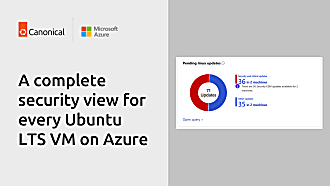Canonical
on 14 November 2019

14 November 2019: Canonical today announced high-availability clustering in MicroK8s, the workstation and appliance Kubernetes, and enterprise SQL database integration for its multi-cloud Charmed Kubernetes.
“The rapid rise of enterprise and edge Kubernetes creates a challenge for corporate IT, with thousands of edge nodes running Kubernetes, and hundreds of cloud Kubernetes clusters,” said Stephan Fabel, Director of Product at Canonical. “The next generation of Canonical’s Kubernetes offerings reduce the number of moving parts, and embrace standard corporate SQL databases for Kubernetes data stores, to address the operational consequences of Kubernetes cluster sprawl.”
Canonical’s MicroK8s gained popularity as an IoT, appliance and developer workstation Kubernetes, with a very small footprint suitable for edge devices and laptops. MicroK8s 1.16 added clustering, enabling rapid deployment of highly standardised small K8s clusters. The next step is to ensure high availability of these clusters, using Canonical’s Dqlite distributed SQL engine. Dqlite removes process overhead by embedding the database inside Kubernetes itself, and reduces the memory footprint of the cluster which is important for IoT.
RAFT and SQLite are well-understood best practices for distributed and embedded systems. Using Dqlite as the Kubernetes datastore simplifies the deployment of a resilient K8s cluster. Telco and retail edge applications can now achieve high reliability at very low cost on x86 or ARM commodity appliances such as clusters of Intel NUCs or Raspberry Pi boards.
The move to SQL as a data store is mirrored in Canonical’s multi-cloud Charmed Kubernetes, embracing corporate databases such as Oracle, SQL Server, MySQL and Postgres, and public cloud SQL offerings like AWS Relational Database Service (RDS). Administrators will be able to use these familiar SQL databases for Kubernetes cluster data instead of etcd.
“We retain etcd for those users who are comfortable with it,” said Fabel, “but enabling the standard enterprise database set makes it easier for many IT teams to operate K8s.”
<ends>
About Canonical
Canonical is the publisher of Ubuntu, the OS for most public cloud workloads as well as the emerging categories of smart gateways, self-driving cars and advanced robots. Canonical provides enterprise security, support and services to commercial users of Ubuntu. Established in 2004, Canonical is a privately held company.



